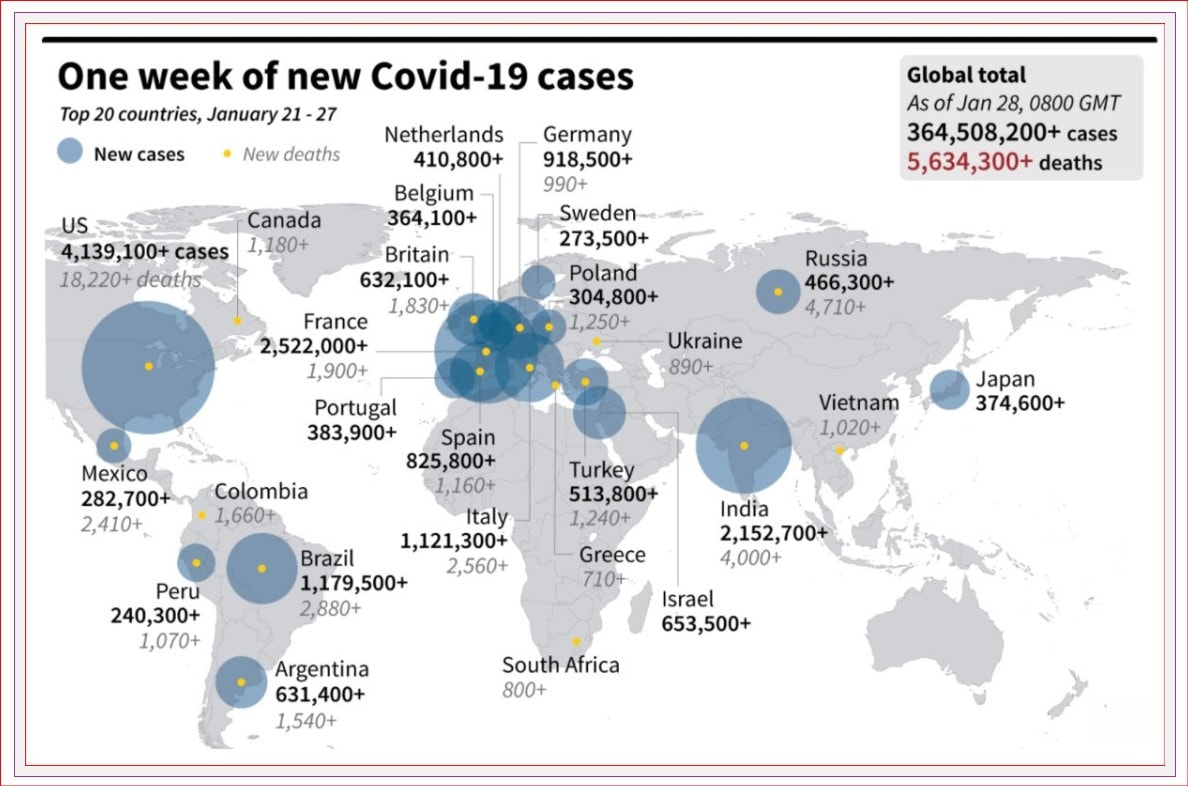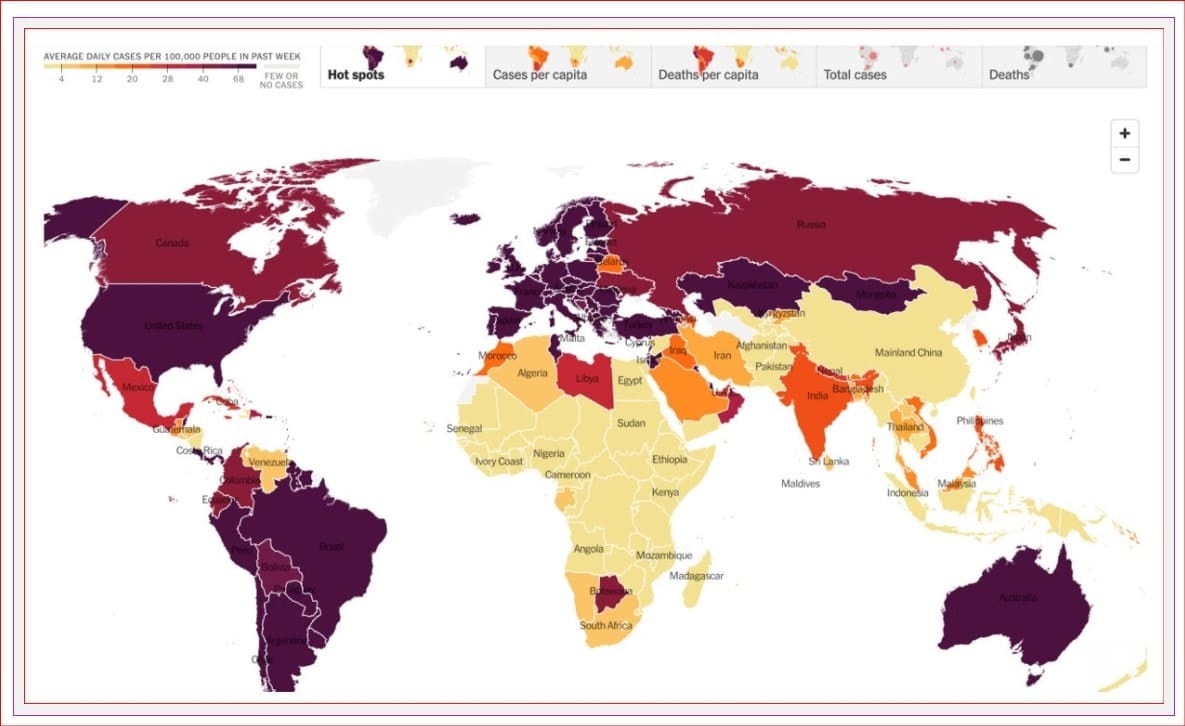Happy Monday, friends!
I hope you had a wonderful weekend, and your kids are happy and safe back in school.
Let’s jump into the bad news, good news, common questions of the week and my silver lining.
What is the bad news?
There have been over 364 million cases of COVID-19 worldwide, with over 5.6 million deaths.

Almost 3 million cases of COVID have been confirmed in Canada, with nearly 33,200 deaths. About 11,000 people are hospitalized with COVID-19 in Canada.

The number of infections remains vastly underestimated due to reduced testing. Severe illness trends are still rising across Canada.
The Public Health Agency of Canada (PHAC) has detected more than 50 cases of the new Omicron subvariant under investigation by the United Kingdom as a variant of concern.
Prime Minister Justin Trudeau was exposed to a close contact with COVID, and he is now in isolation after testing negative on rapid antigen testing.
In North and South America, cases are at the highest level ever, with a 32% jump in new infections from the previous week. Deaths have increased 37%, according to the Pan American Health Organization.
New cases of COVID-19 in the Americas were the highest they were ever during the pandemic last week, with 8 million new cases. The Omicron variant has become the predominant strain due to its contagiousness.
The United States continues to have the highest number of new infections. Mexico, particularly the southern states, have seen new infections triple. In Brazil, cases have gone up nearly 200% in the last week.
Despite an ongoing surge of new cases, the United Kingdom lifted most COVID restrictions last week. They say their vaccine booster role out has reduced severe illness and hospitalizations enough to go back to a more normal way of life.
Masks are no longer required by law in England. There is no longer a legal requirement for COVID-19 passes to be shown for entry into nightclubs or other high-risk settings.
What is the good news?
Almost 10 BILLION vaccines have been given worldwide. 61% of people have received the first dose, and 52% are fully vaccinated (2 or more doses).
Over 90 million COVID-19 vaccines have been given in Canada, 5.8 million of which were given to kids. 88% of people five and older have received the first dose, and 82% are fully vaccinated.
What is the latest guidance on COVID-19 Vaccines in Children?
Last week the PHAC released updated advice from NACI regarding the vaccine for kids aged 5 to 11. These recommendations are based on NACI’s expert opinion and the current scientific evidence.
NACI recommends that 2 Pfizer vaccines be given to kids aged 5-11 with at least eight weeks between the first and second doses.
Previously, NACI recommended that the vaccine may be offered to children 5 to 11 years of age. Now they say the vaccine should be offered.
Which children should receive a third COVID-19 vaccine dose?
NACI now recommends that kids aged 5 to 11 who are moderate to severely immunocompromised should be offered a three-dose primary series of the 10ug Pfizer vaccine. A third dose should be offered for moderately to severely immunocompromised children who have received two doses.
Do COVID vaccines affect fertility?
A new study involving in-vitro fertilization patients in the United States found that those who received a Moderna or Pfizer COVID-19 vaccine had the same fertility and pregnancy outcomes as unvaccinated patients. The researchers say this provides further evidence that mRNA vaccines are safe for pregnant individuals and those trying to get pregnant. Vaccination rates amongst pregnant people remain low.
What is BA.2?
On Friday, I mentioned on my Instagram, a potential new variant bully in town. A descendent of the Omicron variant that has been found in at least 40 countries, including in Canada, the U.K and the United States. This version of Omicron is considered ‘stealthier,’ as its genetics make it somewhat harder to detect. Some researchers and clinicians worry it could also be more contagious. As is often the case in the pandemic, we are waiting for more information. It appears that as soon as we start to figure out one strain, a new one rears its head, and we have to learn all over again. Sorry, friends.
Update on Pfizer accessibility in Ontario
Last week, the Ministry of Health announced that there is now a confirmed stable supply of the adult Pfizer vaccine. We no longer have to prioritize its use for the 12-29 age group.
The Moderna vaccine remains in stable supply and can continue to be administered broadly.
Toronto Public Health recommends
- Individuals aged 12-29 years are to be offered the Pfizer 30ug Vaccine
- Individuals aged 30 years and over should first be offered a Moderna COVID vaccine. Those who do not wish to receive Moderna may be offered the Pfizer 30 ug COVID-19 Vaccine to avoid missing an opportunity to receive the vaccine.
My silver lining of the week
Kids are back in school, and I see firsthand several times a day how enthusiastic and happy they are to be back with their peers and their teachers. There is a dramatic difference in kids coming into Kidcrew. They are skipping, bouncing, smiling. It’s like they are whole and fulfilled again. It’s remarkable and uplifting.
Have a fabulous weekend, everyone,


![[Dr. Dina News] IMPORTANT UPDATE re. VIRTUAL CARE](https://drdina.ca/wp-content/uploads/2021/01/dr-dina-kulik-kids-and-virtual-care-1a-400x250.jpg)
![[Dr. Dina News] COVID-19 Vaccine for Infants and Young Children.](https://drdina.ca/wp-content/uploads/2021/04/dr-dina-kulik-kids-and-vaccines-400x250.jpg)
![[Dr. Dina News] COVID-19 Vaccine for Infants and Young Children.](https://drdina.ca/wp-content/uploads/2022/04/DRD-1-400x250.jpg)






